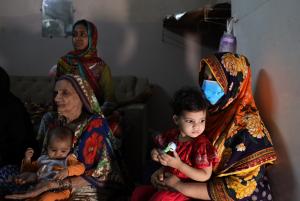The MMS program stands as a testament to the power of collaboration between JFF and Pakistan’s Ministry of National Health Services Regulations and Coordination
BEACHWOOD, OHIO, USA, August 26, 2024 /EINPresswire.com/ — The health and well-being of mothers and children are essential to the future of any nation. In Pakistan, addressing maternal and child health challenges requires a concerted effort from various stakeholders. The Multiple Micronutrient Supplement (MMS) program stands as a testament to the power of collaboration between the Junaid Family Foundation (JFF) and several partners, including Pakistan’s Ministry of National Health Services Regulations and Coordination (MoNHSRC). This joint initiative, which has been active for over three years now, is playing a significant role in reducing micronutrient deficiencies and improving health outcomes for mothers and children across the country.
MMS, which contains 15 essential vitamins and minerals, reduces the risk of newborn death by 29% and decreases the chances of babies being born underweight by 19%, stunted by 8%, or stillborn by 21%.¹ The primary objectives of the MMS program include reducing anemia among pregnant women, improving birth outcomes, and enhancing overall maternal and child health. These goals align with national health priorities set by Pakistan’s government and adhere to international health standards. The collaboration between JFF, the MoNHSRC, and other partners like Kirk Humanitarian, the manufacturer of MMS, has been pivotal in driving this initiative forward, ensuring it receives the necessary support and resources for success.
A key accomplishment of the MMS program was the formation of the MoNHSRC Strategic Technical Working Group (STWG) on MMS. Established in early 2024, the STWG is composed of key stakeholders for MMS in Pakistan, including representatives from JFF, UNICEF, and the Bill & Melinda Gates Foundation. This group works collaboratively to ensure MMS is distributed where it is needed and that both healthcare workers and expectant mothers receive proper education about the product. The STWGs goal is to ensure the effectiveness and sustainability of the MMS program.
The success of the MMS program in Pakistan is a direct result of strong partnerships and the organizations that have contributed along the way. With over one million bottles of MMS distributed since the pilot program in 2021 and an additional one million bottles ready to be distributed in 2024; the MMS program exemplifies the power of collaboration in addressing critical health issues. The joint efforts of JFF, Pakistan’s MoNHSRC, government agencies, and nonprofit organizations have created a successful model for improving maternal and child health in Pakistan. As this partnership continues to grow, it will be essential to maintain and expand similar initiatives, ensuring that every mother and child in Pakistan has access to the care they need for a healthier future.
¹ “Evidence.” Kirk Humanitarian, 13 Aug. 2024, kirkhumanitarian.org/evidence/.
Julie Novario
Junaid Family Foundation
jnovario@junaidfamilyfoundation.org
Visit us on social media:
LinkedIn
Legal Disclaimer:
EIN Presswire provides this news content “as is” without warranty of any kind. We do not accept any responsibility or liability
for the accuracy, content, images, videos, licenses, completeness, legality, or reliability of the information contained in this
article. If you have any complaints or copyright issues related to this article, kindly contact the author above.
![]()





